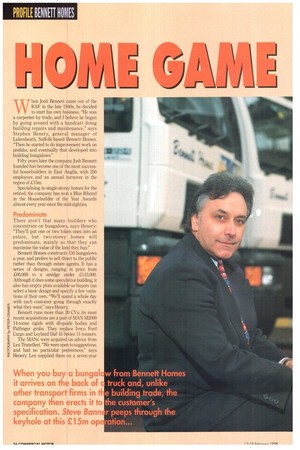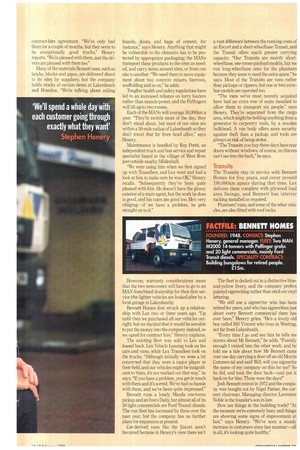PROFILE BENNETT HOMES W hen Josh Bennett came out of the
Page 58

Page 59

If you've noticed an error in this article please click here to report it so we can fix it.
RAF in the late 1940s, he decided to start his own business. "He was a carpenter by trade, and I believe he began by going around with a handcart doing building repairs and maintenance," says Stephen Henery, general manager of Lakenheath, Suffolk-based Bennett Homes. -Then he started to do improvement work on prefabs, and eventually that developed into building bungalows."
Fifty years later the company Josh Bennett founded has become one of the most successful housebuilders in East Anglia, with 250 employees and an annual turnover in the region of £15m.
Specialising in single-storey homes for the retired, the company has won a Blue Riband in the Housebuilder of the Year Awards almost every year since the mid-eighties
Predominate
There aren't that many builders who concentrate on bungalows, says Henery: "They'll put one or two token ones into an estate, but two-storey homes will predominate, mainly so that they can maximise the value of the land they buy."
Bennett Homes constructs 150 bungalows a year, and prefers to sell direct to the public rather than through estate agents. It has a series of designs, ranging in price from £60,000 to a smidge under £143,000. Although it does some speculative building, it also has empty plots available so buyers can select a basic design and specify a few variations of their own. "We'll spend a whole day with each customer going through exactly what they want," says Henery.
Bennett runs more than 20 CVs; its most recent acquisitions are a pair of MAN M2000 14-tonne rigids with dropside bodies and Pa'finger grabs. They replace Iveco Ford Cargo and Leyland Daf 45 Series 11-tonners.
The MANs were acquired on advice from Lex Transtleet. "We were open to suggestions, and had no particular preferences," says Henery Lex supplied them on a seven-year contract-hire agreement "We've only had them for a couple of months, but they seem to be exceptionally good trucks," Henery reports. "We're pleased with them, and the drivers are pleased with them too."
Many of the materials Bennett uses, such as bricks, blocks and pipes, are delivered direct to its sites by suppliers; but the company holds stocks of certain items at Lakenheath and Brandon. "We're talking about ceiling boards, doors, and bags of cement, for instance," says Henery. Anything that might be vulnerable to the elements has to be protected by appropriate packaging; the MANs transport these products to the sites as needed, and carry items around sites, or from one site to another. "We need them to move equipment about too; concrete mixers, barrows, scaffolding and so on," he adds.
Tougher health arid safety regulations have led to an increased reliance on lorry loaders rather than muscle power, and the Palfingers will lift up to two tonnes.
Each of the MANs will average 50,000km a year. "They're mobile most of the day, they don't stand about, but most of our sites are within a 50-mile radius of Lakenheath so they don't travel that far from head office," says Henery.
Maintenance is handled by Ray Pettit, an independent truck and bus service and repair specialist based in the village of West Row, just outside nearby Mildenhall.
"We were using him when we first signed up with Transfleet and Lex went and had a look at him to make sure he was OK," Henery recalls. "Subsequently they've been quite pleased with him. He doesn't have the glossy exterior of a main agent, but the work he does is good, and his rates are good too. He's very obliging—if we have a problem, he gets straight on to it."
However, warranty considerations mean that the two newcomers will have to go to an MAN franchised dealership for their first service (the lighter vehicles are looked after by a local garage in Lakenheath).
Bennett Homes first struck up a relationship with Lex two or three years ago. "Up until then we purchased all our vehicles outright, but we decided that it would be sensible to put the money into the company instead, so we opted for contract hire," Henery explains.
The existing fleet was sold to Lex and leased back. Lex Vehicle Leasing took on the cars and vans, while Lex Transfleet took on the trucks. "Although initially we were a bit concerned that they were a major player in their field, and our vehicles might be insignificant to them, it's not worked out that way," he says. "If you have a problem, you get in touch with them and it's sorted. We've had no hassle with them, and we've been quite impressed."
Bennett runs a lonely Mazda one-tonne pickup and an Iveco Daily, but almost all of its 20 light commercials are Ford Transit diesels. The van fleet has increased by three over the past year, but the company has no further plans for expansion at present.
Car-derived vans like the Escort aren't favoured because in Henery's view there isn't a vast difference between the running costs of an Escort and a short-wheelbase Transit, and the Transit offers much greater carrying capacity. "Our Transits are mainly shortwheelbase, one-tonne-payload models, but we run long-wheelbase ones for the plumbers because they seem to need the extra space," he says. Most of the Transits are vans rather than pickups or tippers, but one or two crewbus models are operated too.
"The vans we've most recently acquired have had an extra row of seats installed to allow them to transport six people," says Henery. They're separated from the cargo area, which might be holding anything from a generator to carpentry tools, by a wooden bulkhead. A van body offers more security against theft than a pickup, and tools are always at risk of being stolen.
"The Transits you buy these days have rear doors without windows, of course, so thieves can't see into the back," he says.
Transits The Transits stay in service with Bennett Homes for five years, and cover around 190,000km apiece during that time. Lex delivers them complete with plywood load area linings, and Bennett has interior racking installed as required.
Plumbers' vans, and some of the other vehicles, are also -fitted with roof racks.
The fleet is decked out in a distinctive blueand-yellow livery, and the company prefers painted signwriting rather than stick-on vinyl lettering.
"We still use a signwriter who has been retired for years, and who has signwritten just about every Bennett commercial there has ever been," Henery grins. "He's a lovely old boy called Bill Vincent who lives in Weeting, not far from Lakenheath.
"Every time I go and see him he tells me stories about Mr Bennett," he adds. "Funnily enough I visited him the other week, and he told me a tale about how Mr Bennett came over one day carrying a door off an old Morris Commercial and said 'Bill, will you signwrite the name of my company on this for me?' So he did, and took the door back—and put it back on for him. Those were the days!"
Josh Bennett retired in 1972 and the company was bought out by Nigel Parker, the current chairman. Managing director Lawrence Noble is the founder's son-in-law.
How are things in the building trade? "At the moment we're extremely busy and things are showing some signs of improvement at last," says Henery. "We've seen a steady increase in customers since last summer—all in all, it's looking quite healthy."
FACTFILE: BENNETT HOMES FOUNDED: 1948. CONTACT: Stephen Henery, general manager. FLEET: Two MAN M2000 14-tonners with Palfinger grabs and 20 light commercials, mainly Ford Transit diesels. SPEC IAUTY CONTRACT: Building bungalows for retired people. t t




















































































































